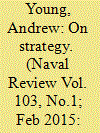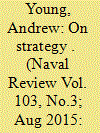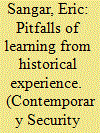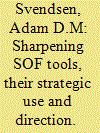| Srl | Item |
| 1 |
ID:
138012


|
|
|
|
|
| Summary/Abstract |
In the first of a series of four articles, the author examines some of the pitfalls and issues facing modern strategists, whether military or civilian. He begins with an exploration of strategy through its evolution, definitions, and some of the tensions in the politico-military continuum. He uncovers causes of friction in the remarkable trinity of passion, chance and reason, and identifies sources of evidence to aid us in our education.
|
|
|
|
|
|
|
|
|
|
|
|
|
|
|
|
| 2 |
ID:
139966


|
|
|
| 3 |
ID:
146812


|
|
|
|
|
| Contents |
Why do armies often fail to transmit and coherently apply lessons from their past? Using the concept of ‘layered organizational culture’, this article formulates a pioneering theoretical argument to explain how military organizations learn from their historical experience. Analysing empirical material from internal debates within the British Army, the article observes an inherent incompatibility between lessons gleaned from, on the one hand, the Anglo-Afghan Wars and, on the other hand, British counterinsurgency campaigns after 1945. This is less a result of actual differences in the external context but of changing organizational ‘filters’: different layers of military organizational culture result in different ways of selecting and transmitting relevant lessons from warfare experience. Older and newer cultural layers can interact and thus contribute to incoherent strategy-making in the present. This argument is illustrated by reviewing the layering process within the British Army since the 19th century. The article shows a shift from emphasizing the specificity of local contexts towards the application of universal principles. This has contemporary relevance: co-exisiting yet incompatible historical lessons contributed to significant incoherence in operational strategy during the initial months of the British deployment in Afghanistan in 2006.
|
|
|
|
|
|
|
|
|
|
|
|
|
|
|
|
| 4 |
ID:
132725


|
|
|
|
|
| Publication |
2014.
|
| Summary/Abstract |
Focusing on contemporary Special Forces (SOF/SF), this article analyses expanding SF developments in the context of conducting rapidly proliferating multi-functional operations during an overall era of globalised strategic risk. This is while SF simultaneously have to negotiate the not necessarily reconcilable challenge of wider national-to-global-impacting defence transformation and military cuts, which include extending to closely impacting on SF support units. When examining the optimisation of the command of special operations, including better developing Special Operations Commands (SOCOMs) or closest nearest equivalents, and when evaluating the attendant advancement of what can be best characterised as the improved strategic direction and use of SF, several helpful operational-to-strategic and structural-to-cultural lessons soon emerge. For both now and for differently ranging futures, further consideration of these noteworthy lessons is warranted.
|
|
|
|
|
|
|
|
|
|
|
|
|
|
|
|